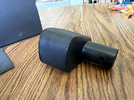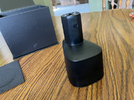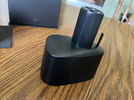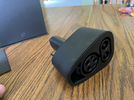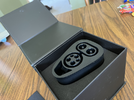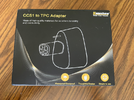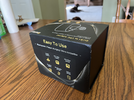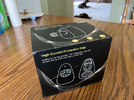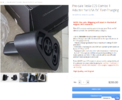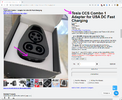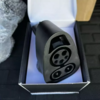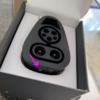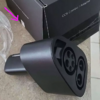Due to information/product vacuums caused when Tesla allegedly stepped in and prevented further sales of Korean CCS1 adapters to North America (e.g., by helpful businesses like Harumio), several new potential sources of adapters originated in 2022.
September 21, 2022 Update: Tesla North America has (finally) released its CCS1 adapter to Canadian and U.S. customers. The adapter is available to all (four) Tesla models, provided cars are CCS-enabled. [Hardware/software retrofits are now available from Tesla for cars currently without CCS capability.]
December 26, 2023 news tidbits: (a) Still no Tesla-provided CCS hardware/software updates for non-CCS-compatible Models 3 & Y; but maybe as soon as next month (January 2024)? (b) As discussed elsewhere, the scheduled adoption, now by almost all electric car manufacturers, of the NACS (North American Charging Standard--i.e., the original 2012 Tesla Proprietary Standard plugs and ports) suggests that the CCS standard may (join CHAdeMO and) become a dying technology in North America in coming years. (c) A2Z, a Canadian firm partnering with Asian manufacturer Olink, is now offering the first (to my knowledge) working combined CCS1 (DC)-J1772 (AC) adapter.
* Includes shipping to North America.

Note: Adapter images are not to the same scale.
Comments:
* @wk057 has a bench-top dissection of a CHAdeMO adapter here, showing all the control circuitry necessary (hence the CHAdeMO adapter's larger size, by the way).

Disclosures and Alerts:
September 21, 2022 Update: Tesla North America has (finally) released its CCS1 adapter to Canadian and U.S. customers. The adapter is available to all (four) Tesla models, provided cars are CCS-enabled. [Hardware/software retrofits are now available from Tesla for cars currently without CCS capability.]
December 26, 2023 news tidbits: (a) Still no Tesla-provided CCS hardware/software updates for non-CCS-compatible Models 3 & Y; but maybe as soon as next month (January 2024)? (b) As discussed elsewhere, the scheduled adoption, now by almost all electric car manufacturers, of the NACS (North American Charging Standard--i.e., the original 2012 Tesla Proprietary Standard plugs and ports) suggests that the CCS standard may (join CHAdeMO and) become a dying technology in North America in coming years. (c) A2Z, a Canadian firm partnering with Asian manufacturer Olink, is now offering the first (to my knowledge) working combined CCS1 (DC)-J1772 (AC) adapter.
"New" (in 2022) Sources of CCS1 Adapters
(Grouped by type.)
(Grouped by type.)
Source | Price | Specific Notes | Availability (in NA) |
|---|---|---|---|
Genuine Tesla Adapter | |||
$250 $340(CAN) $345(CAN) |
| AVAILABLE. | |
Tesla-Adapter Copies | |||
$294 $319 $250 $235 $246 $251 $239 $216 $230 $203 $175 $161 $132 $119* |
| AVAILABLE. | |
$200 $170 $185 $180 $165 $155 $140 |
| AVAILABLE. | |
Independently-designed Aftermarket Adapters | |||
A2Z Shop (Canada) | $270 $227 $195 $175 $121* |
| AVAILABLE. |
In Development | |||
-na- |
| Currently Unavailable. | |
Note: Adapter images are not to the same scale.
Comments:
- USE FOR AC J1772-PLUG CHARGING? - Some/all J1772 plugs can be inserted into the upper circular socket of many CCS1 adapters. This perpetuated the previous misconception that all CCS1 adapters could be used to accept J1772 plug-outfitted charging cables. That is still untrue. Most CCS1 adapters are exclusively for DC charging, while J1772 plugs are used for AC Level 2 charging.
|
However, there is news on this front: The latest A2Z Thunderstorm adapter will apparently handle both DC and AC charging. See that website for more information.
|
Meanwhile, the other CCS1 adapters listed in this post are (afaik) still not usable with any J1772 AC cable-plug device. So normally a CCS1 adapter is not necessary for AC charging (from 240v wall outlets and at Level 2 charging stations). TMC members have convincingly demonstrated (via photographs) that most other Tesla and aftermarket CCS1 adapters seen so far lack certain key electrical connectors necessary for AC J1772 charging (see here). Again, the A2Z adapter is apparently the exception. But for other CCS1 adapters, for a North American Tesla you can use AC charging equipment with J1772 plugs only with a proper J1772 adapter (now including the A2Z CCS1/J1772 adapter).
- CHARGING LOCKS - Adapters designed for use in North American Tesla cars routinely come with a locking notch (at the bottom of the Tesla proprietary [TPC] plug that inserts into the charging port) that will prevent most unintended adapter-removal (i.e., theft) from the port during a charging session. Some manufacturers/suppliers are also addressing the second undesirable issue of having a CCS1 cable-plug/handle prematurely removed from the other end of the adapter during charging. See individual supplier webpages about any features designed to prevent undesired cable removal.
- INTERNAL DESIGN - Most third-party CCS1 adapters appear to have a relatively simple straight "pass-through" circuitry design (with no or minimal amounts of solid-state circuitry components), as does the OEM Tesla adapter (I believe). The original SETEC adapter--with its battery-powered, CHAdeMO-mimicking software/hardware and 50kW charge rate maximum--is the notable exception.
- CCS COMPATIBILITY - CCS1 adapters that lack on-board control circuitry (i.e., most/all adapters other than the original SETEC device) require that the car be "CCS-enabled." (In other words, some kind of CCS-allowing control electronics must be present inside either the adapter or the car.) In general, most Teslas from early 2020 to June 2021, and from November 2021 to present are so enabled; but check your car's CCS status before purchasing an adapter.
- To check CCS status:
- Center Touchscreen Display.
- "Software" screen.
- Choose "Additional Vehicle Information" link.
- Examine "CCS adapter support" status. Status should appear as either "Enabled" or "Not installed."
- If "Not installed" (CCS incompatible), owners of Models S, X, 3, and Y can now purchase hardware/software updates from Tesla. There were also clever DIY (do it yourself) workarounds for Models 3 and Y before the factory retrofits became available.
...
- To check CCS status:
- ADVERTISED CHARGING RATES - For several reasons I am no longer reporting charging rate specifications; in part because the new (2022) adapters all claim a maximum charging rate of at least 150kW, up to 250kW (as does the Tesla OEM adapter).
TMC Forum posts report widely varying charging rates for seemingly all CCS1 adapters (both Tesla and third-party). The reason is apparently that many conditions and factors--e.g., car model, age, and condition; the battery's initial charge level and temperature at the start of a charging session; and additional factors--may affect maximum and ongoing charging rates at any particular time. Clearly the design and condition/health of the particular charging station being used makes a difference (with variation even seen among charging stations of the same company and at particular stations on different days). Also important: exactly when a reading is taken during a charging session. Charging rates rise and fall naturally over the course of a full session (here is one example). When a car starts with a relatively low battery level (say at 20% capacity), a moderately-high start, followed by an aggressive ramp-up, and then a gradual decline is commonplace.
Taking all this into account, a single charging rate index number may not be a particularly helpful (or honest) decision-making factor. Better, perhaps, would be a series of comparative charge-session graphs with conditions held relatively constant (e.g., 20%-to-80% charge sessions, batteries preconditioned to best operating temperatures, moderate ambient temperatures, use of the same charging station, etc.). Clearly we need someone like Tom Moloughney (YouTube "State of Charge" Channel) to objectively test, side-by-side, all the CCS1 adapter alternatives. In addition to comparative charge rates, I would also be interested in internal design, and build quality. (But I certainly do not want to dissect my own, or indeed any, precious CCS1 adapter to investigate.)
It is still early days, but one (still untested, afaik) hypothesis is that adapters with straight "pass-through" circuitry designs (including the Tesla OEM device) will all perform in generally similar fashion given the same conditions. If that proves true, the choice of product then comes down to factors other than maximum rate of charge; such as build-quality, safety features, cost (and we are seeing aftermarket sellers actively match or undercut the Tesla adapter price), size and weight, availability, brand loyalty, purchase convenience, customer service, and so forth. I haven't looked inside an adapter, but I imagine that the size/bulk, design, and metallurgical content of electrical contacts and conductors may be important (e.g., for resistance and hence energy loss through heat). This is DC high-voltage fast-charging, so you want beefy components here, people. Consider the analogy of making a purchase choice from among various brands of NEMA 14-50 wall receptacles with different prices and/or construction/designs. They all work, but...(BUY HUBBELL!--or, even better yet, a Tesla or name brand wall connector.)
- CAVEATS - Information (e.g., prices, descriptions) on some sites can change frequently and unexpectedly. Some initial products and websites are no more. Again, be cautious. After a long wait, adapters (and now CCS hardware upgrades for Models S & X) for are finally available from Tesla in North America. Therefore, many might now argue that the genuine CCS1 adapter (and factory hardware retrofits if needed) from Tesla in North America are the safest course. But will Tesla supplies be consistently adequate to meet demand? We'll see. (As of 03/8/24, Tesla's ongoing stock of CCS1 adapters appears to remain satisfactory.)
- CURRENCY - Prices listed here are in US dollars.
- CAUTION - Please note the alert (in red) at the bottom of this post.
| - For drivers whose cars are still incompatible with most CCS1 adapters and who, for whatever reason, prefer not want to use the original SETEC/Lectron CCS1 adapter (below), Tesla/aftermarket CHAdeMO adapters are still sometimes available (used/new) (e.g., on Craig's List), and are are alternative source for DC charging at the remaining stations in North America. At about a maximum of about 50kW, performance is similar to the SETEC/Lectron CCS1 adapter but without the hassle of software update incompatibility. CHAdeMO adapters are somewhat bulky*, however.
|
Tesla CHAdeMO Adapter
| - Finally, with recent (2023) inroads by Tesla into having its proprietary charging standard become the so-called North American Charging Standard (NACS)--adopted by more and more manufacturers of electric cars sold in North America (latest count appears to show that almost all NA electric cars will adopt the NACS within a couple of years)--it is easy to envision a time in the near future when virtually all new and many modified NA electric battery-powered vehicles will use the simple AC/DC Tesla standard plugs and ports. If that happens, the CCS1 standard could conceivably become obsolete. For now, though, CCS1 adapters remain a worthy accessory for Tesla drivers who travel extensively.
* @wk057 has a bench-top dissection of a CHAdeMO adapter here, showing all the control circuitry necessary (hence the CHAdeMO adapter's larger size, by the way).
Prior Sources of CCS1 Adapters
(In order of release?)
(In order of release?)
Source | Price | Specific Notes | Adapter Type | Availability (in NA) |
|---|---|---|---|---|
$525 |
| "Aftermarket" Straight "pass- through" circuitry. | Currently unavailable. | |
$300 |
| "Aftermarket" Hardware/software used to mimic CHAdeMO technology. | AVAILABLE. | |
~$227 (US) |
| "Tesla OEM" Straight "pass- through" circuitry. | AVAILABLE (in Korea). | |
Disclosures and Alerts:
- In 2022 I purchased two Tesla-Korea CCS1 adapters, along with aftermarket cases for those adapters, from Harumio in South Korea. (I found the process painless and convenient and staff there helpful and professional.) I paid the standard Harumio retail prices. I do not own, nor have I seen or handled, any of the other CCS1 adapters.
- More importantly, I have not received, nor am I or will I be receiving any payment or compensation in any form whatsoever from any company or individual regarding CCS1 adapters (or for that matter any other Tesla- or auto-related issue). All opinions, right or wrong, offered in this post are my own.
- The third-party CCS1 adapter market continues to be competitive. Product specifications and information (especially availability and prices) can evolve suddenly and unexpectedly as the market adjusts to recent events. Therefore, information included here may be in error or out-of-date. If you choose to purchase a third-party product, always check with the seller for the latest information and discounts before buying. As with other Tesla-applicable accessories, consumers now have a choice of factory or aftermarket products.
Last edited:



